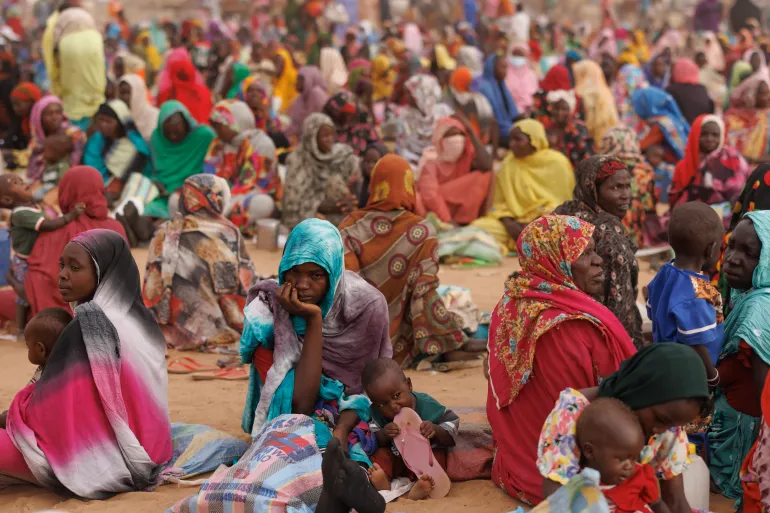Sudanese refugees, mostly women and children, wait for a food distribution point to open at a temporary camp on April 22, 2024, in Adre, Chad [Dan Kitwood/Getty Images]Today, African heads of state are convening on the margins of the African Union Summit in Addis Ababa to discuss Sudan’s devastating conflict and come up with strategies to try and put the country on a path to peace and stability.
It is no surprise that Sudan remains at the top of the continent’s agenda. Nearly two years into the war, with tens of thousands dead and millions displaced, the country is now the scene of one of the world’s largest humanitarian crises.
At the centre of this ever-growing crisis are Sudan’s women and girls, who are facing a multi-faceted threat due to the widespread weaponisation of rape within the conflict.
I have just returned from Renk, a town in neighbouring South Sudan where more than a million people fleeing the war, including women and girls who survived the worst imaginable acts of violence, have sought refuge.
In the narrow pathways between the makeshift tents they now call “home”, I spoke with many of them and listened to their stories of pain, loss and shattered dreams.
Afrah*, a fifteen-year-old girl whose youthful eyes carry a deep pain well beyond her years, bravely told me about a night in September that changed her life forever.
She said she was alone with her three siblings – aged seven, four and two – in their family home in Khartoum. The war was getting closer and closer, and her mother had left to try and get funds to arrange for the family’s escape to the South.
They first heard gunshots in the distance and then witnessed armed men breaking into nearby houses, beating and shooting their neighbours.
Eventually, two of the men broke their front door down, searched the house and realised Afrah was alone with her siblings. They pointed a gun at her and ordered her brothers away, threatening to kill them all if she refused to obey their orders.
Then for almost two hours, they took turns to rape her. She said she tried to remain as silent as possible, fearing that if she made too much noise, they might harm her brothers. The soldiers eventually left.
Afrah cleaned herself up, checked up on her siblings, and continued to wait for her mother’s return. When her mum made it back home a few hours later and saw what the soldiers had done to her neighbours, she was overwhelmed by grief. Afrah decided not to tell her what she had endured to protect her from further suffering.
Afrah is just one of thousands of women and girls in Sudan who have experienced sexual violence at the hands of fighters. Indeed, rape has become a common weapon of war in Sudan. The perpetrators hardly ever face any accountability, while survivors are left to continue their lives, often in derelict refugee camps, with deep physical and psychological scars and no meaningful support.
Sudan’s war displaced more than 11 million people, including 5.8 million women and girls. Many of them have been subjected to sexual violence during the war, and they continue to face severe challenges in their places of refuge. Even those who made it into neighbouring countries, such as South Sudan and Chad, are not safe and properly cared for. They have little money or resources and lack access to adequate healthcare. There is rarely anyone around to help them process and overcome their trauma.
In most cases, the only support available to these women are the few safe spaces created by NGOs where they can share their experiences and receive basic medical care.
Women and girls like Afrah, who have endured the worst horrors of Sudan’s war, deserve protection and safety. Leaders meeting today in Addis Ababa must focus their discussions on them and take immediate action to ensure their long-term care and well-being. Caring for survivors is a crucial step in bringing this conflict to a definitive end – only when women and girls like Afrah are safe and cared for can Sudan begin to heal.
Today, Africa’s leaders must move beyond empty words and take concrete action to protect Sudan’s women and girls. They must pressure all parties to the conflict to respect international law and ensure safe, unrestricted humanitarian access to all survivors of sexual violence. Those in positions of power have ignored the vicious weaponisation of rape in this conflict for too long. This is the time to act. Afrah and thousands of others like her are in urgent need of help. We must not ignore their plight.
About the Author

Media and communications advisor, Oxfam in Africa
